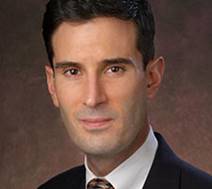The incoming chair of the Office of Veteran and Military Affairs (OVMA) Advisory Board, Richard M. (Rich) Jones ’92, G’95, L’95, believes that President Abraham Lincoln’s second inaugural address provides us with a call to action. He says that the most important obligation as a nation and as a university community is to “[T]o care for those who have borne the battle.” Jones says it is this very commitment that has guided the leaders of Syracuse University for many decades and will shape the future for generations to come. “The idea of how to best support our veterans and military families is continuously evolving,” Jones says. “Our nation spends billions of dollars each year recruiting and then training our young men and women in uniform. We need to be as equally purposeful as they transition out of uniform and into the civilian workforce.”

Jones, who is the executive vice president, general tax counsel and chief veteran officer at ViacomCBS, believes the OVMA is well-positioned to build a broader, innovative network of support for veterans and their families—one that leverages the resources of the University as well as those of the public and private sector.
“In my estimation, in order for the OVMA to be as impactful as it can, we must, to use a military term, be hyper aware of ‘the conditions on the ground’ because conditions affecting this generation of transitioning veterans are changing in ways that we can’t even imagine and they will need our best thinking and support,” he says.
Jones describes himself as just a hard-working soldier who has never forgotten where he came from. He was a non-commissioned officer in the U.S. Army, where he served honorably as a member of the 75th Ranger Regiment and 10th Mountain Division. “I still operate like the staff sergeant that I was: head on a swivel, always looking out 1,000 meters,” Jones says. “Our mission at Syracuse University is to provide a world-class education. What should distinguish our approach to serving student veterans? What Syracuse does, which is so unique, is to supplement the classroom instruction with community, support, mentoring and life-coaching and always providing the practical survival skills necessary to be successful in the civilian workplace and beyond.”
